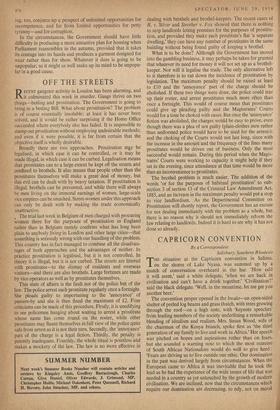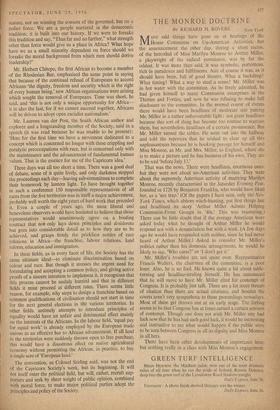CAPRICORN CONVENTION
By a Correspondent Salisbury,'Southern Rhodesia
THE situation at the Capricorn convention in Salima. on the shores of Lake Nyasa, was summed up by a snatch of conversation overheard in the bar. 'How odd it will seem,' said a white delegate, 'when we are back in civilisation and can't have a drink together.' Civilisation?' said the black delegate. 'Well, in the meantime, let me get you another beer.'
The convention proper opened in the bwalo—an open-sided shelter of peeled log beams and grass thatch, with trees growing through the roof—on a high note, with 'keynote speeches' from leading members of the society underlining a remarkable blending of idealism and realism. Mrs. Susan Wood, wife of the chairman of the Kenya branch, spoke first as 'the third generation of my family to live and work in Africa.' Her speech was pitched on hopes and aspirations rather than on fears. but she sounded a warning note to which the most extreme of South African Nationalists would do well to give heed : `Fears are driving us to live outside our ethic. Our domination in the past was derived largely from circumstances. When the European came to Africa it was inevitable that he took the lead as he had the experience of the wide issues of life that was needed in a country as yet untouched by, the growth of modern civilisation. We are inclined, now that the circumstances which require our domination are decreasing, to rely, not on moral stature, nor on winning the consent of the governed, but on a police force. We are a people nurtured in the democratic tradition; it is built into our history. If we were to forsake this tradition and say, "Thus far and no farther," what strength other than force would give us a place in Africa? What hope have we as a small minority dependent on force should we forsake the moral background from which men should derive I eadership?'
Mr. Herbert Chitepo, the first African to become a member of the Rhodesian. Bar, emphasised the same point in saying that because of the continual refusal of Europeans to accord Africans 'the dignity, freedom and security which is the right of every human being,' new African organisations were arising which sought the removal of Europeans. Time was short, he said, and 'this is not only a unique opportunity for Africa— it is also the last, for if we cannot succeed together, Africans will be driven to adopt open racialist nationalism.'
Mr. Laurens van der Post, the South African author and explorer and a longstanding member of the Society, said in a Teech (it was read because he was unable to be present): `Here for the first time we have a movement dedicated to a concept which is concerned no longer with these crippling and paralytic preoccupations with race, but is concerned only with the maintenance and the advancement of fundamental human values. That is the essence for me of the Capricorn idea.'
Three days was all too short a time. There was a good deal of debate, some of it quite lively, and only darkness stopped the proceedings each day—leaving sub-committees to complete their homework by lantern light. To have brought together in such a conference 150 responsible representatives of all races from the five territories was in itself a major achievement, probably well worth the eight years of hard work that preceded it. Even a couple of years ago, the most liberal and benevolent observers would have hesitated to believe that those representatives would unanimously agree on a binding contract that not only lays down principles and desiderata but goes into considerable detail as to how they are to be itieved, and grasps firmly the prickliest nettles of race relations in Africa—the franchise, labour relations, land reform, education and immigration.
In these fields, as in every facet of life, the Society has the same ultimate ideal—to eliminate discrimination based on colour and race. But though it stresses the urgent need for formulating and accepting a common policy, and giving active proofs of a sincere intention to implement it, it recognises that this process cannot be unduly hurried and that in different fields it must proceed at different rates. There seems little reason, for example, why steps to design a franchise based on common qualifications of civilisation should not start in time for the next general elections in the various territories. In other fields, untimely attempts to introduce principles of equality would have, an unfair and detrimental effect mainly on the interests of the Africans. In the labour field, 'equal pay for equal work' is already employed' by the European trade unions as an effective bar to African advancement. If all land in the territories were suddenly thrown open to free purchase, this would have a disastrous effect on native agricultural economy without permitting the African, in practice, to buy a single acre of 'European land.'
The convention, as Colonel Stirling said, was not the end of the Capricorn Society's work. but its beginning. It will not itself enter the political field, but will, rather, recruit sup- porters and seek by sheer weight of public opinion, combined with moral force, to make major political parties adopt the principles and policy of the Society.



































 Previous page
Previous page